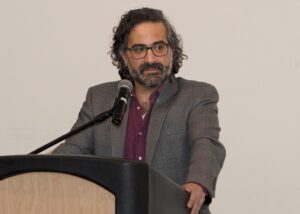- About Ramapo
- Academics
- Admissions & Aid
- Student Life
- Athletics
- Alumni
- Arts & Community
- Quick Links
- Apply
- Visit
- Give
Fortnite and Holocaust Education: Dr. Jacob Labendz in the New York Times

August 17, 2023
A Holocaust museum became part of Fortnite this week. “Voices of the Forgotten,” designed by Luc Bernard, is accessible in the popular game for players to visit. The intention: To learn about those who helped save the lives of Jewish people as well as the Jewish people who were part of The Resistance.

Luc Bernard’s the Voices of the Forgotten Museum in Fortnite, which aims to educate players about the Holocaust. Screen capture courtesy of Luc Bernard.
Dr. Jacob Labendz, director of the Center for Holocaust and Genocide Studies, sees the potential of leveraging a gaming platform to bring awareness to and teach about the Holocaust, which he shared with the New York Times, adding:
“I would encourage everyone to consider the striking potential of Luc Bernard’s forays into Holocaust education on gaming platforms. We face a number of challenges, not the least of which is the slow passing of the survivor generation. We also must reorient ourselves to the needs and socialization patterns of younger people around the world. Luc has forced us all to consider new and untested modalities with tremendous promise. As one might expect, major players have responded with cautious interest and a measure of ambivalence. On the one hand, the move to virtual space signals a step towards democratization. That facilitates wider communication, but weakens the control of major stakeholders over what may be said and how. This brings me to the other hand, one absolutely pertinent to Luc’s experience doing this work. I do not mean to slander all gamers at all, but it is from within parts of this broad and global community that much of the Alt-Right emerged. This accounts for the high levels of harassment that Luc has faced. In the end, I’m excited for how we may develop these new technologies and approaches as a community.”
The Center produces and disseminates new and vital scholarly knowledge in the field of Holocaust and genocide studies, including adjacent areas of inquiry such memory studies, legal and international affairs, and the study of racism, antisemitism, and other forms of bigotry. It is committed to implementing innovative educational practices. Thanks to the generosity of Stan Richmond, long-time supporter, Friend of Ramapo College, and member of the Foundation Board of Governors, who made a gift in memory of his wife, Mignon Richmond, technology updates in the Center will include a gaming computer and virtual reality goggles. Ramapo College students and guests of the Center will be able to explore and learn more about the Holocaust. “Who knows? Perhaps they will even make some of their own,” shared Labendz.
To learn more about the consequential work performed in the Center for Holocaust and Genocide Studies, visit ramapo.edu/holocaust.
Copyright ©2025 Ramapo College Of New Jersey. Statements And Policies. Contact Webmaster.


Follow Ramapo